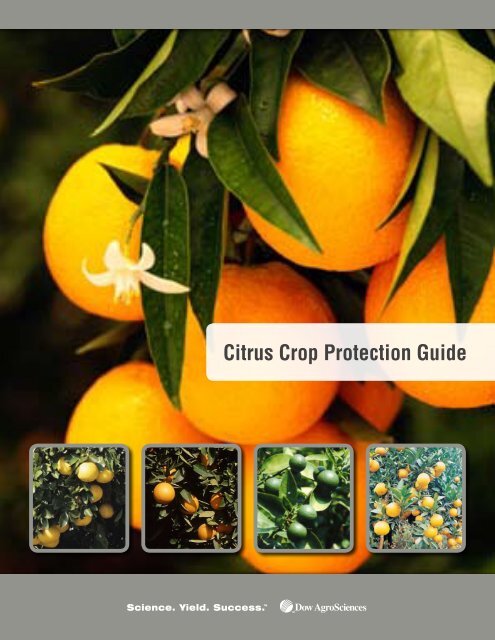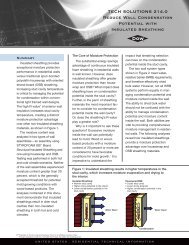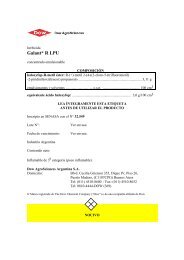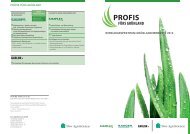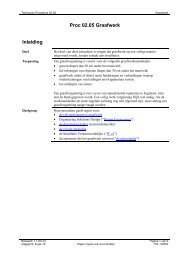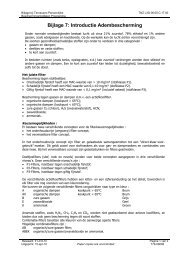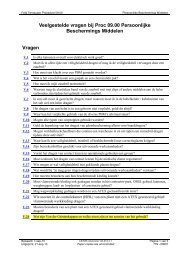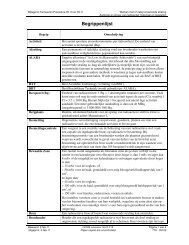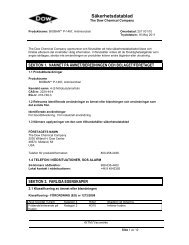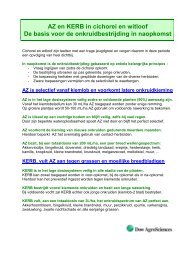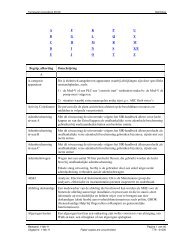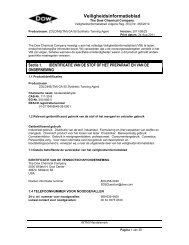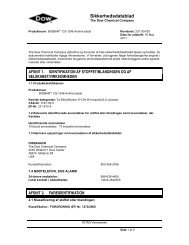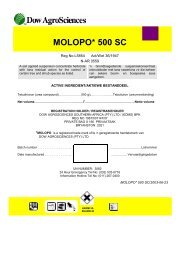citrus crop Protection Guide
citrus crop Protection Guide
citrus crop Protection Guide
Create successful ePaper yourself
Turn your PDF publications into a flip-book with our unique Google optimized e-Paper software.
<strong>citrus</strong> <strong>crop</strong> <strong>Protection</strong> <strong>Guide</strong>
2<br />
InnovatIve mode of actIon<br />
to control destructIve Insects.<br />
Producing a high-quality <strong>citrus</strong> <strong>crop</strong> requires protection from tough-tocontrol<br />
insects. Delegate WG insecticide features an innovative active<br />
ingredient called spinetoram, which effectively controls <strong>citrus</strong> psylla,<br />
<strong>citrus</strong> leafminer and more. Effective control — combined with favorable<br />
application features and low or no impact on beneficials — makes<br />
Delegate WG a valuable part of a <strong>citrus</strong> insect control program.<br />
How delegate WG can benefit<br />
a <strong>citrus</strong> insect control program.<br />
• Broad-spectrum control of today’s toughest <strong>citrus</strong> pests, including Asian<br />
<strong>citrus</strong> psylla, <strong>citrus</strong> leafminer, <strong>citrus</strong> orangedog and avocado leafroller<br />
• New mode of action (Group 5 insecticide), providing a new product to<br />
rotate in the fight against psyllid and leafminer<br />
• No tank-mixing required when control of <strong>citrus</strong> leafminer is needed and<br />
Asian <strong>citrus</strong> psylla is present<br />
• Fast knockdown plus residual control deliver continuing activity across<br />
multiple insect growth stages<br />
• Re-entry interval (REI) of just four hours allows for more convenient<br />
completion of other important tasks<br />
• Preharvest interval (PHI) of just one day offers the potential for greater<br />
application flexibility prior to harvest<br />
• Delegate WG maintains populations of most beneficial insects without<br />
flaring secondary pests<br />
• Spinetoram received the 2008 Presidential Green Chemistry Challenge<br />
Award from the EPA<br />
• For application rates, see the back cover<br />
<strong>Protection</strong> for key <strong>citrus</strong> <strong>crop</strong>s.<br />
• Oranges • Tangerines • Grapefruits • Lemons • Limes<br />
Key pests controlled.<br />
• Asian <strong>citrus</strong> psylla (vector for <strong>citrus</strong> greening — one of the biggest<br />
issues facing the <strong>citrus</strong> industry today 1 )<br />
• Citrus leafminer (predisposes tree to canker)<br />
• Citrus orangedog<br />
• Lepidopterous larvae, including:<br />
– Fruit tree leafroller<br />
– Avocado leafroller
spinetoram — an innovative mode of action<br />
for superior insect control.<br />
Spinetoram, the active ingredient in Delegate WG, is the latest<br />
development in the spinosyn class of chemistry. Spinetoram<br />
provides long-lasting control of a broad spectrum of insect<br />
pests in a variety of <strong>crop</strong>s — all at low rates with minimal<br />
impact on most beneficial insects. It also delivers multiple<br />
advantages in an insect control program, including:<br />
• Increased activity across multiple insect growth stages<br />
• Photostability provides residual control<br />
• Translaminar activity, or leaf penetration, provides<br />
effective control of leafminer larvae<br />
• Early results of trials indicate the potential for four<br />
to five weeks of Asian <strong>citrus</strong> psylla control<br />
• Fits Integrated Pest Management (IPM) programs<br />
and increases options for resistance management<br />
• Maintains populations of many beneficial insects<br />
and related organisms<br />
resistance management notes.<br />
• Do not make more than two consecutive applications of Group 5 insecticides (spinetoram and spinosad).<br />
• Rotate to another class of effective insecticides for at least one application if additional treatments are<br />
required after two consecutive applications of Group 5 insecticides.<br />
• Do not use Delegate WG insecticide in <strong>citrus</strong> nurseries or on <strong>citrus</strong> in greenhouses.<br />
• Make no more than three applications per calendar year.<br />
fast and lasting control of leafminers.<br />
Delegate WG delivers fast knockdown and long-lasting control of leafminers during summer flush —<br />
to help prevent canker and protect the value of oranges, grapefruit, lemons and more.<br />
INSECTICIDE<br />
figure 1. efficacy of delegate WG Insecticide against <strong>citrus</strong> leafminer on navel oranges (24 days after application)<br />
Agri-Mek 10 oz*<br />
Delegate 4 oz*<br />
Untreated<br />
No leafminer pupae 24 days after Delegate application.<br />
0 1 2 3 4<br />
5<br />
Pupae/10 terminal flush samples<br />
One spray application, spring 2007. Lukasz Stelinski, University of Florida, Lake Alfred, Fla.<br />
*Includes adjuvant<br />
3
figure 2. efficacy of delegate WG Insecticide against <strong>citrus</strong> leafminer on valencia oranges (28 days after application)<br />
controls multiple growth stages of asian <strong>citrus</strong> psylla.<br />
The innovative mode of action of Delegate WG is effective against both adults and nymphs of the tough-to-control<br />
Asian <strong>citrus</strong> psylla, which helps manage the spread of the devastating effects of <strong>citrus</strong> greening (see Page 7).<br />
figure 3. control of asian <strong>citrus</strong> Psyllid adults (21 days after treatment)<br />
Dimethoate 1 pt*<br />
Agri-Mek 20 oz*<br />
Agri-Mek 10 oz*<br />
Sevin XLR 2 qts*<br />
Provado 10 oz*<br />
Mustang 4.3 oz<br />
Danitol 16 oz<br />
Delegate 4 oz*<br />
Lorsban ®<br />
-4E 5 pt*<br />
Untreated<br />
Dimethoate 1 pt*<br />
Agri-Mek 20 oz*<br />
Agri-Mek 10 oz*<br />
Sevin XLR 2 qts*<br />
Provado 10 oz*<br />
Mustang 4.3 oz<br />
Danitol 16 oz<br />
Delegate 4 oz*<br />
Lorsban ®<br />
-4E 5 pt*<br />
Untreated<br />
0 1 2<br />
Mean number of psyllids per 10 flushes<br />
3 4<br />
(Trial 2008-10. UF/IFAS/Citrus Research & Education Center, Lake Alfred)<br />
*Includes adjuvant<br />
figure 4. control of asian <strong>citrus</strong> Psyllid nymphs (21 days after treatment)<br />
0 .10 .20<br />
Psyllid nymph ratings per flush<br />
.30 .48<br />
(Trial 2008-10. UF/IFAS/Citrus Research & Education Center, Lake Alfred)<br />
*Includes adjuvant<br />
To learn more about the importance of controlling Asian <strong>citrus</strong> psyllid to manage the spread of <strong>citrus</strong> greening,<br />
see Page 7. To learn more about Delegate WG insecticide, visit www.DelegateInsecticide.com. For more information<br />
about Dow AgroSciences or any of our <strong>crop</strong> protection products, e-mail us at info@dow.com, call 1-800-258-3033<br />
or visit our Web site at www.FarmSmart.com.<br />
4<br />
Agri-Mek 5 oz*<br />
Delegate 4 oz*<br />
Citrus oil 435 2% v/v<br />
Untreated<br />
0 10 20 30 40 50 60 70<br />
Percent of leaves damaged<br />
One spray application, 2006. University of Florida, Lake Alfred, Fla.<br />
*Includes adjuvant<br />
INSECTICIDE
select a funGIcIde to matcH your sPecIfIc needs.<br />
Dow AgroSciences offers a family of fungicides to help producers<br />
control diseases in high-value <strong>citrus</strong> <strong>crop</strong>s. For an overview of the entire<br />
Dow AgroSciences portfolio for selected <strong>crop</strong>s and diseases, see the back cover.<br />
enable ® 2f fungicide provides lasting protection for <strong>citrus</strong> fruit.<br />
A supplemental label allows Enable 2F to be used as a protectant fungicide<br />
with these benefits:<br />
• Can be applied to a wide range of <strong>citrus</strong> fruits, including, but not limited<br />
to: <strong>citrus</strong> hybrids, oranges, grapefruit, lemons, limes and tangerines<br />
• Controls three important diseases at the 8 fl. oz./acre rate: greasy spot<br />
(rind blotch), scab and sooty mold<br />
• Delivers a minimum of 14-day residual protection and is highly resistant<br />
to wash-off because of its excellent penetration of the plant<br />
• Provides reach-back activity of two to four days, offering extra protection<br />
against disease already present<br />
• One-day preharvest interval — can be applied up to the day of harvest<br />
• See the product label for complete rates, timing and application information<br />
timing.<br />
Greasy spot: • Make first application at the normal time in your area<br />
• Make a second application after the first summer flush for control of greasy spot<br />
of foliage and rind blotch of fruit<br />
• For high-value fruit, a third application may be made for fruit protection<br />
Scab: • Make the first application between feather flush and 25 percent expansion of spring leaf flush<br />
• Make a second application at petal fall<br />
• Apply another fungicide three to four weeks later for control of late scab and early melanose<br />
Sooty mold: • Applications made for control of greasy spot or scab will also control sooty mold<br />
Optimum disease control may be obtained by applying Enable 2F with a nonionic surfactant or spray oil at a<br />
manufacturer’s recommended rate and making a thorough coverage application. Do not apply Enable 2F with<br />
polymer-based spray adjuvants.<br />
Do not make more than three applications per year.<br />
resistance management notes.<br />
Enable 2F belongs to the sterol demethylation inhibitor (DMI) class of fungicides or Group 3 fungicides.<br />
The use of Enable 2F should be part of a resistance management strategy that includes alternation and/or<br />
mixing with fungicides of different target sites of action. Consult your local or state agricultural authorities<br />
for resistance management strategies that are appropriate for your disease management program.<br />
FUNGICIDE<br />
5
a relIable Partner for versatIle and effectIve Insect control.<br />
Dow AgroSciences is advancing one of the most trusted solutions you rely on. Now, Lorsban ® insecticide is available in<br />
a new formulation called Lorsban Advanced insecticide. It provides all the benefits of Lorsban-4E in a low-odor, water-<br />
based formulation. Benefits of Lorsban Advanced include:<br />
• Same great efficacy as Lorsban-4E — including quick knockdown and residual control — at the same use rate<br />
• First chlorpyrifos low-odor and low-VOC formulation<br />
• Easy to handle and apply using the same use rates as Lorsban ® -4E insecticide<br />
• Same tank-mix flexibility with pesticides, fertilizers and adjuvants as Lorsban-4E<br />
• Significantly lower odor than Lorsban-4E when applied<br />
• Higher flash point (2x higher than Lorsban-4E) due to its water-based formulation; fewer restrictions on<br />
transportation and storage<br />
• Broad-spectrum insect control in multiple <strong>crop</strong>s using a variety of application methods — Lorsban Advanced<br />
controls sucking insects, chewing insects and soil insect pests, and can be used to treat row, tree and specialty <strong>crop</strong>s<br />
• Backed by Dow AgroSciences, offering unprecedented customer service, including quality technical field support,<br />
and knowledgeable and experienced sales representatives<br />
controls key pests in <strong>citrus</strong>.<br />
• Asian <strong>citrus</strong> psylla (vector for<br />
<strong>citrus</strong> greening)<br />
• Citrus rust mites (Florida only)<br />
• Scale insects<br />
• Mealybugs<br />
• Aphids<br />
• Lepidopterous larvae, including:<br />
– Avocado leafroller<br />
– Cutworms<br />
– Citrus orangedog<br />
• Grasshoppers<br />
• Katydids<br />
• Foraging ants (orchard floors)<br />
timing.<br />
Treat when pests become<br />
a problem or in accordance<br />
with the local spray schedule<br />
as recommended by your<br />
State Agriculture Experiment<br />
Station, certified Pest Control<br />
Adviser or Extenson Service<br />
Specialist. For application<br />
rates, see the back cover.<br />
6
<strong>citrus</strong> greening management.<br />
Monitor populations by checking mature leaves for adults and flush shoots<br />
for all stages. Dormant spray: Spray Lorsban Advanced once or twice on all<br />
<strong>citrus</strong> during the dormant season to target overwintering adults surviving<br />
on mature foliage. Ask a Dow AgroSciences representative for details.<br />
It’s critical to control the spread of <strong>citrus</strong> greening.<br />
• Citrus greening is already a “10” on a threat scale of 1 to 10 in Florida,<br />
according to Andrew Meadows of Florida Citrus Mutual. He calls it “the<br />
biggest issue the industry is facing right now.” 1<br />
• Citrus greening is caused by one of the three strains of the bacteria Candidatus Liberibacter — Asian, African or<br />
American. It has caused worldwide catastrophic losses to the <strong>citrus</strong> industry and it is expected to continue to spread.<br />
• The disease is commonly called <strong>citrus</strong> greening because fruit from infected trees does not ripen properly —<br />
particularly those areas not directly exposed to sunlight.<br />
• Citrus greening is incurable and it results in a chronic decline of <strong>citrus</strong>. Once the tree is infected, there is<br />
no known way to effectively control the disease, other than tree removal.<br />
• A symptomatic tree may have a life expectancy of only three to five years. Young trees will not reach maturity<br />
and infected mature trees will produce significantly less fruit until death.<br />
• The disease has not been eradicated because it cannot be detected early enough — symptoms are not expressed<br />
for up to three years after the tree is infected.<br />
• Industry experts agree that controlling the disease’s insect vector, the Asian <strong>citrus</strong> psyllid (Diaphorina citri),<br />
is critical to managing the spread of <strong>citrus</strong> greening.<br />
• Rotate classes of insecticides to prevent resistance development.<br />
It’s practical to use delegate WG insecticide and/or<br />
lorsban ® advanced insecticide.<br />
Each has its strengths in an Asian <strong>citrus</strong> psyllid control program.<br />
delegate WG provides:<br />
• New class of chemistry (spinetoram)<br />
• Excellent control of Asian <strong>citrus</strong> psylla, plus other key pests<br />
• Maintenance of most populations of beneficials; doesn’t flare mites<br />
• REI: four hours<br />
• PHI: one day<br />
lorsban advanced provides:<br />
INSECTICIDE<br />
• Cost-effectiveness<br />
• Broad-spectrum control<br />
• Excellent residual control<br />
• Practical dormant spray solution<br />
• Compatible with many insecticides, miticides and fungicides<br />
7
ely on our Pest manaGement PortfolIo for cItrus croPs.<br />
Dow AgroSciences continues to make a significant investment in research and development. As a result,<br />
we can provide technological advancements and forward-thinking solutions to address pest problems<br />
and protect <strong>crop</strong>s — both today and tomorrow. This table provides an overview of our <strong>citrus</strong> portfolio.<br />
QuIcK reference for veGetable croPs †<br />
( † Selected <strong>crop</strong>s, pests and diseases. See the product labels for complete information.)<br />
InsectIcIdes Key Pests rates<br />
delegate WG Citrus leafminer<br />
Asian <strong>citrus</strong> psylla<br />
Citrus orangedog<br />
Lepidopterous larvae, including:<br />
– Fruit tree leafroller<br />
– Avocado leafroller<br />
lorsban ® advanced Aphids<br />
Grasshoppers<br />
Katydids<br />
Lepidopterous larvae<br />
Citrus rust mites<br />
www.farmsmart.com 800-258-3033<br />
1 Weise E. ‘Greening’ disease threatens the core of U.S. <strong>citrus</strong> <strong>crop</strong>s. USA Today, September 25, 2008:9D.<br />
3 – 6 oz./acre<br />
Control of leafminer and psylla may be improved by the addition of an adjuvant<br />
to the spray mixture<br />
3 – 6 oz./acre<br />
2 – 7 pts./acre*<br />
Asian <strong>citrus</strong> psylla (Florida 2[ee]) 5 pts./acre<br />
(For best results add <strong>citrus</strong> oil at 2% v/v)<br />
funGIcIde diseases rate<br />
enable ® 2f**<br />
Scab<br />
Greasy spot<br />
Sooty mold<br />
8 oz./acre<br />
* Under Product Bulletin (2ee) recommendation, Lorsban Advanced is foliar-applied at a rate of 5 pints per acre per application for control of <strong>citrus</strong> psylla on <strong>citrus</strong>. Best results are seen when Lorsban Advanced is tank-mixed<br />
with <strong>citrus</strong> oil at 2% v/v.<br />
**Supplemental label (not for use in California).<br />
® Delegate, Enable, Lorsban, M-Pede and “Science. Yield. Success.” are trademarks of Dow AgroSciences LLC Lorsban Advanced, Lorsban-4E, Agri-Mek, Mustang and Danitol are federally Restricted Use Pesticides.<br />
State restrictions on the sale and use of Enable apply. Consult the label before purchase or use for full details. Always read and follow label directions. L01-359-004 (2/09) BR 010-32669 DAAGDELE8021


